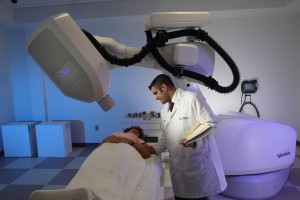When a person has metastatic cancer, the brain is one of the organs that cancer cells can migrate to. If this happens, the condition is called brain metastases. 
If this occurs, radiation treatment is often used to control these areas of disease. Research is finding that utilizing CyberKnife radiosurgery as the initial treatment for people with four or less brain metastases is associated with improved survival and reduced risk of memory loss compared to whole brain radiation. CyberKnife radiosurgery is a very precise image guided treatment that uses multiple beams of radiation from a variety of directions to destroy the diseased area while avoiding the surrounding healthy tissue.
Accuracy counts
The CyberKnife instrument aims many beams of radiation at the same target from multiple directions and angles according to a treatment plan that is designed just for you. CyberKnife moves around you and delivers the beams one at a time.
Alone, each beam of radiation is not strong enough to damage the part of the brain it travels through on the way to the target. Where they meet, however, the combined strength is able to destroy the cells. That is very important – especially when treating very sensitive areas in your brain.
The combined total amount of radiation from all of those individual beams is much higher than the amount of radiation that could be delivered by conventional radiation, which often leads to better, and safer tumor control and cure.
An alternative to surgery
CyberKnife Radiosurgery may be an alternative to brain surgery, so a patient is able to:
- Avoid general anesthesia, an incision in his or her scalp, and the risk of infection or other surgical complications
- Avoid shaving his or her head in preparation for treatment
- Experience a much shorter recovery time than after surgery
- Usually leave the center right after treatment and resume your normal daily activities
Your doctor may recommend CyberKnife radiosurgery if you have had multiple surgeries already and would like to avoid additional surgeries, or you are too sick to have surgery. If you have more than one serious medical condition, your doctor may determine CyberKnife radiosurgery is a safer option for you. Radiosurgery may, in fact, be your best option regardless of your situation.
Treating conditions of the brain with CyberKnife Radiosurgery
CyberKnife Radiosurgery can be used to treat:
- Brain tumors (tumors originating in the brain)
- Benign brain tumors(not cancer), such as meningioma, acoustic neuroma, pituitary adenoma
- Malignant brain tumors(cancer), such as gliomas
- Metastatic brain tumors(cancer that has spread to the brain from another area of the body)
- Recurrent or residual brain tumors
- Arteriovenous malformation (AVM)
- Essential tremor
- Trigeminal neuralgia (also known as tic douloureaux)
Although CyberKnife is used to treat conditions of the brain, your doctor may recommend one or the other based on your particular situation.
For more information on CyberKnife Radiosurgery please visit this link : https://safemedtrip.com/medical-services/advanced-technology-treatment-in-india/cyber-knife-radiosurgery.html

 Click to WhatsApp
Click to WhatsApp +91-9899993637
+91-9899993637



